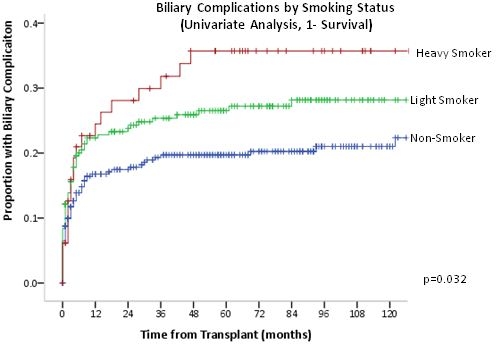Tobacco Use Is a Significant Risk Factor for Post-Transplant Biliary Complications
Surgery, University of Rochester Medical Center, Rochester, NY.
Meeting: 2015 American Transplant Congress
Abstract number: 107
Keywords: Bile duct, Liver transplantation, Multivariate analysis, Risk factors
Session Information
Session Name: Concurrent Session: Liver Retransplantation and Other Complications
Session Type: Concurrent Session
Date: Sunday, May 3, 2015
Session Time: 4:00pm-5:30pm
 Presentation Time: 4:36pm-4:48pm
Presentation Time: 4:36pm-4:48pm
Location: Room 115-AB
Purpose: Biliary complications following liver transplantation are a significant source of morbidity, potentially leading to graft failure necessitating retransplantation. Smoking precipitates both microvascular and macrovascular thrombosis that causes ischemic damage to the biliary tract epithelium. We sought to evaluate smoking as an independent risk factor for post-transplant biliary complications.
Methods: The clinical course of all adult primary deceased donor liver transplants at our center from 1992-2012 was reviewed. Eligible patients were assigned to cohorts based on their lifetime tobacco exposure and proximity to transplant date: heavy smokers: ≥10 pack-years and smoking within two years of transplant, light smokers: <10 pack-years or ≥10 pack-years and smoking cessation >2 years pre-transplant, and non-smokers: no history of tobacco use. Biliary complications were defined as strictures, leaks, or bilomas that required intervention. Complication rates were analyzed using univariate regression models correlated with donor and recipient characteristics. Associations found during univariate analysis were included in the final multivariate Cox model.
Results: 973 subjects were followed for a median of 76 months, 56% of included subjects had a history of tobacco use- 61% of whom were active smokers within two years of transplant. A significant difference in biliary complication rates was demonstrated between smoking cohorts on univariate analysis, with the heaviest smokers suffering the highest rates, followed by light smokers, and the lowest proportion of complications observed in non-smokers (p=0.03).

On multivariate analysis, smoking status significantly increased the hazard of biliary complications in light (HR= 1.72, p=0.01) and heavy smokers (HR=1.96, p=0.02).
Conclusions: Smoking status is an independent predictor of post-transplantation biliary complications requiring intervention. This study demonstrates the necessity of emphasize smoking cessation early in pre-transplant evaluation as smokers with increased pack-year exposure and more recent smoking history experienced a higher rate of post-transplantation biliary complications.
To cite this abstract in AMA style:
Dulaney D, Dokus M, Orloff M, Kashyap R. Tobacco Use Is a Significant Risk Factor for Post-Transplant Biliary Complications [abstract]. Am J Transplant. 2015; 15 (suppl 3). https://atcmeetingabstracts.com/abstract/tobacco-use-is-a-significant-risk-factor-for-post-transplant-biliary-complications/. Accessed February 20, 2026.« Back to 2015 American Transplant Congress
